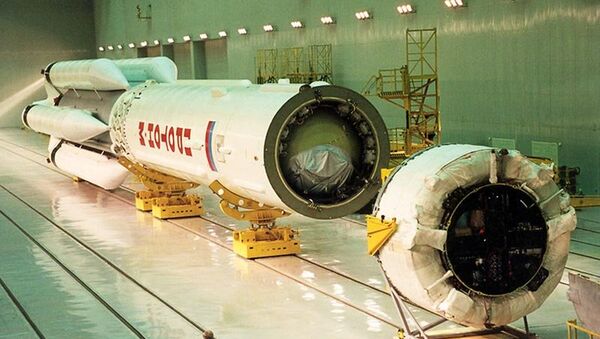Russia’s Briz-M booster, which failed to put two satellites into their target orbit, is likely to keep flying in space for up to five months before sinking into the thicker layers of the atmosphere, a rocket industry source told RIA Novosti on Wednesday.
Russia launched a Proton-M rocket with a Briz-M booster carrying the Telkom-3 and the Express MD2 satellites on Monday from the Baikonur space center in Kazakhstan. However, the booster and the two satellites failed to reach the designated orbit due to a possible engine mishap.
According to U.S. Strategic Command, there are currently four objects with virtually identical orbits following the Proton-M launch.
RIA Novosti’s source suggested that these four objects are the booster, an additional fuel tank, and the two satellites.
“They have separated, so there was some control impact and the command and control system was functional,” the source said, adding that satellite control systems should also have been activated.
“They should respond to commands.”
Russian Space Agency Roscosmos has suspended the launches of Proton-M rocket carriers with Briz-M boosters following the incident.
The two satellites were to provide TV broadcast services in Indonesia.
The Telkom-3 satellite was built by Russia’s Reshetnev rocket company with communication equipment from Thales Alenia Space. The Express MD2 is a small communication satellite designed and manufactured by the Khrunichev State Research and Production Space Center for the Russian Satellite Communications Company(RSCC).
Both satellites were insured by Russian Ingosstrakh and Alfa Strakhovanie. Coverage totaled 1.17 billion rubles ($39 million) for the Express MD2 and 225 million rubles for the Telkom-3.
Briz-M’s history dates back to July 5, 1999 when the first launch resulted in a malfunction of the Proton's second stage, preventing the booster and its payload from reaching the orbit.
In August 2011, the malfunction of a Briz-M booster led to the loss of the Express-AM4 telecommunication satellite.



